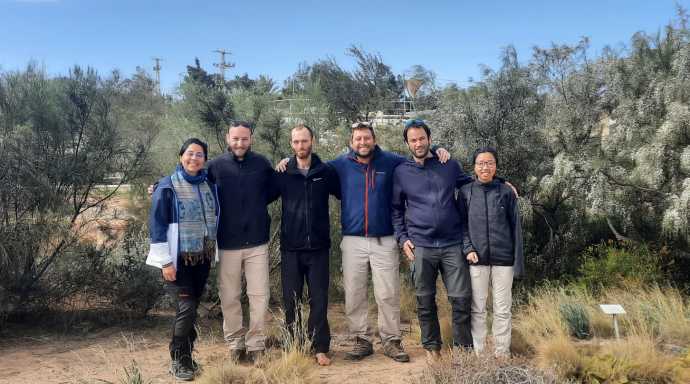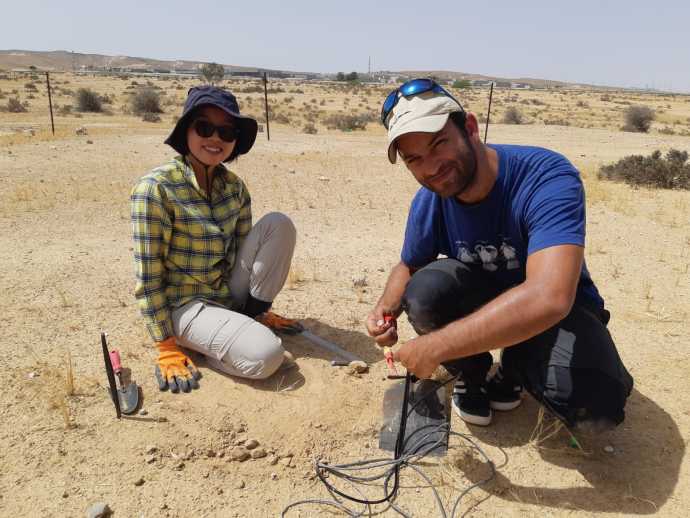In a world increasingly concerned with climate change and environmental sustainability, Ben-Gurion University of the Negev’s Dr. Elad Levintal and his research team are making significant strides in understanding the intricate connections between terrestrial, aquatic, and atmospheric environments.
At their state-of-the-art lab, this team is pioneering innovative research that delves into the movement of water and greenhouse gases, aiming to uncover the impacts of both natural and human-induced processes on our planet.
One of the singular aspects of Levintal’s research lies in its focus on the desert, an understudied area in the context of climate change and the water cycle. This gap in research is largely due to the geographical limitations faced by many institutions involved in climate studies, which are often far removed from desert environments.
“We’re focusing on the movement of greenhouse gases between the soil and the atmosphere,” Levintal explains, “and it’s a bit sad to say, but most of the universities with resources are not next to deserts, so there are fewer studies regarding deserts.”

Leveraging their proximity to desert ecosystems, Levintal’s team can explore how these arid regions contribute to and are affected by climate change, providing invaluable data that other institutions might struggle to obtain.
“We have the advantage,” he notes, “and we have the resources.”
LEVINTAL LEADS a dynamic team, each member bringing unique perspectives and expertise to his or her innovative environmental research. Ariel Altman and Elyasaf Friman, both skilled research technicians, provide critical support in executing complex field experiments, ensuring the accuracy and reliability of data collection.
The team also includes a range of international and local students pursuing advanced degrees, each focusing on a distinct aspect of environmental science. Thi Thuc Nguyan, a PhD student from Vietnam, studies CO2 emissions from deserts. Ehud Lavner, an MSc student, investigates CO2 emissions from boreholes and wells, shedding light on these often-overlooked sources of greenhouse gases.
“They can act like a straw, leading to the subsurface and allowing nasty materials to be emitted from layers that haven’t seen the atmosphere until now,” Levintal explains.
From Ecuador, MSc student Devi Orozco is developing new sensors for environmental research, aiming to enhance data collection precision and efficiency. Tom Norman, a PhD student, is working on AI modeling for decentralized wastewater systems, contributing to sustainable wastewater management solutions.
Robel Kahsu, an MSc student from Ethiopia, focuses on advancing water quality sensors. Together, the team combines their skills and knowledge, leveraging their varied backgrounds and expertise to drive forward impactful research.

THE LAB’S research is characterized by a blend of field experiments and advanced technological development. “First of all, we are identifying emissions of CO2 or methane, and then we’re looking into the mechanisms that are responsible.”
Conducting studies at various sites across Israel and internationally, the team employs a variety of sensors and DIY electronic boards to gather critical data. These sensors measure environmental parameters such as temperature, humidity, soil moisture, and CO2 levels, providing comprehensive insights into how different factors, like wind speed, affect air circulation in soil or the emissions from abandoned water wells.
Their innovative approach has led to fruitful collaborations with numerous prestigious institutions. The team maintains ongoing partnerships with the Geological Survey of Israel, where they work on understanding geological factors affecting greenhouse gas emissions. Collaborating with the Agricultural Research Organization – Volcani Institute, they explore the intersection of agriculture and climate change, particularly focusing on sustainable farming practices and their environmental impacts.
The Dead Sea and Arava Science Center partnership allows the team to study desert environments and their specific climatic challenges. Furthermore, their collaboration with The Hebrew University of Jerusalem enriches their research through interdisciplinary approaches, combining expertise in environmental science, engineering, and technology. Internationally, they work with universities in Germany, the US, and Ecuador, broadening the impact and scope of their research.
These international collaborations facilitate the exchange of knowledge and techniques, enhancing the overall quality and reach of their studies.
LEVINTAL’S RESEARCH is critical in addressing the climate crisis by focusing on desert areas, which have been significantly understudied in environmental science.
Deserts play a vital role in the global climate system, yet they remain relatively unexplored due to their challenging environments and geographical remoteness from most research institutions. This gap in research has hindered understanding of global climate dynamics and the impacts of climate change.
Deserts cover more than 40% of the Earth’s land surface and are key components of our planet’s ecosystem. They significantly influence atmospheric processes that affect global weather patterns and climate, while also acting as carbon sinks and sources, with complex interactions between soil, vegetation, and the atmosphere. Understanding CO2 emissions from deserts is essential for accurate climate modeling and for developing effective mitigation strategies.
“Deserts might be a source for CO2 emissions,” Levintal stresses, “and we cannot neglect them.”
The research he is conducting with his team at the Sde Boker campus of Ben-Gurion University of the Negev leverages their geographical proximity to desert environments. This allows them to conduct in-depth, on-site studies that provide critical data on how deserts contribute to and are affected by climate change. By understanding these processes, scientists can better predict how desert ecosystems respond to increasing temperatures and changing precipitation patterns, which are direct consequences of global warming.
Desert research is also crucial for local and global climate adaptation strategies. Deserts are home to biodiversity and human populations that are highly vulnerable to climate change impacts. By studying these areas, Levintal’s team can inform policies and practices that enhance resilience and sustainability in desert regions, benefiting both local communities and the broader global environment, which makes it indispensable in filling the knowledge gap about deserts’ role in the climate system.
A STANDOUT feature of the team is their commitment to democratizing science: “We are developing new tools for environmental studies,” Levintal says. “Until roughly 10 years ago, if you wanted to measure something like CO2 in the air, you would have to buy a very expensive sensor because that was the only way it worked.”
However, the Maker Community has changed that paradigm. The Maker Community is a community that is not driven by science but rather by pure passion for creating hardware, and shares their designs. The team’s open-source approach involves creating and sharing detailed blueprints, software codes, and assembly instructions for their DIY sensors and data loggers.
This transparency ensures that researchers worldwide can replicate and adapt these tools to their specific needs, fostering global scientific advancement. By building open-source hardware, they aim to reduce the cost barriers associated with water and environmental research, therefore significantly improving the ability to conduct research.
The democratization of science also encourages a more diverse range of perspectives and solutions, as scientists from different backgrounds and regions can now participate more actively in addressing global environmental challenges. Levintal shares his vision for this process.
“Let’s say that during a successful research study in my lab we develop something, and then in the next few years 10 or 20 labs will use this system – then we did our share.” He notes that the CO2 emission measurement system, which was developed by PhD student Thi Thuc Nguyan during her initial doctoral studies, will soon be published as a standalone system for others to use.
In their groundbreaking work, the team has faced significant challenges since Oct. 7. The geopolitical climate has made finding and maintaining international collaborations more difficult. Undeterred, these obstacles only highlight the importance of their work and the resilience of the team as they continue to push forward in their research endeavors.
This article was written in cooperation with Ben-Gurion University of the Negev.
The Environment and Climate Change portal is produced in cooperation with the Goldman Sonnenfeldt School of Sustainability and Climate Change at Ben-Gurion University of the Negev. The Jerusalem Post maintains all editorial decisions related to the content.
